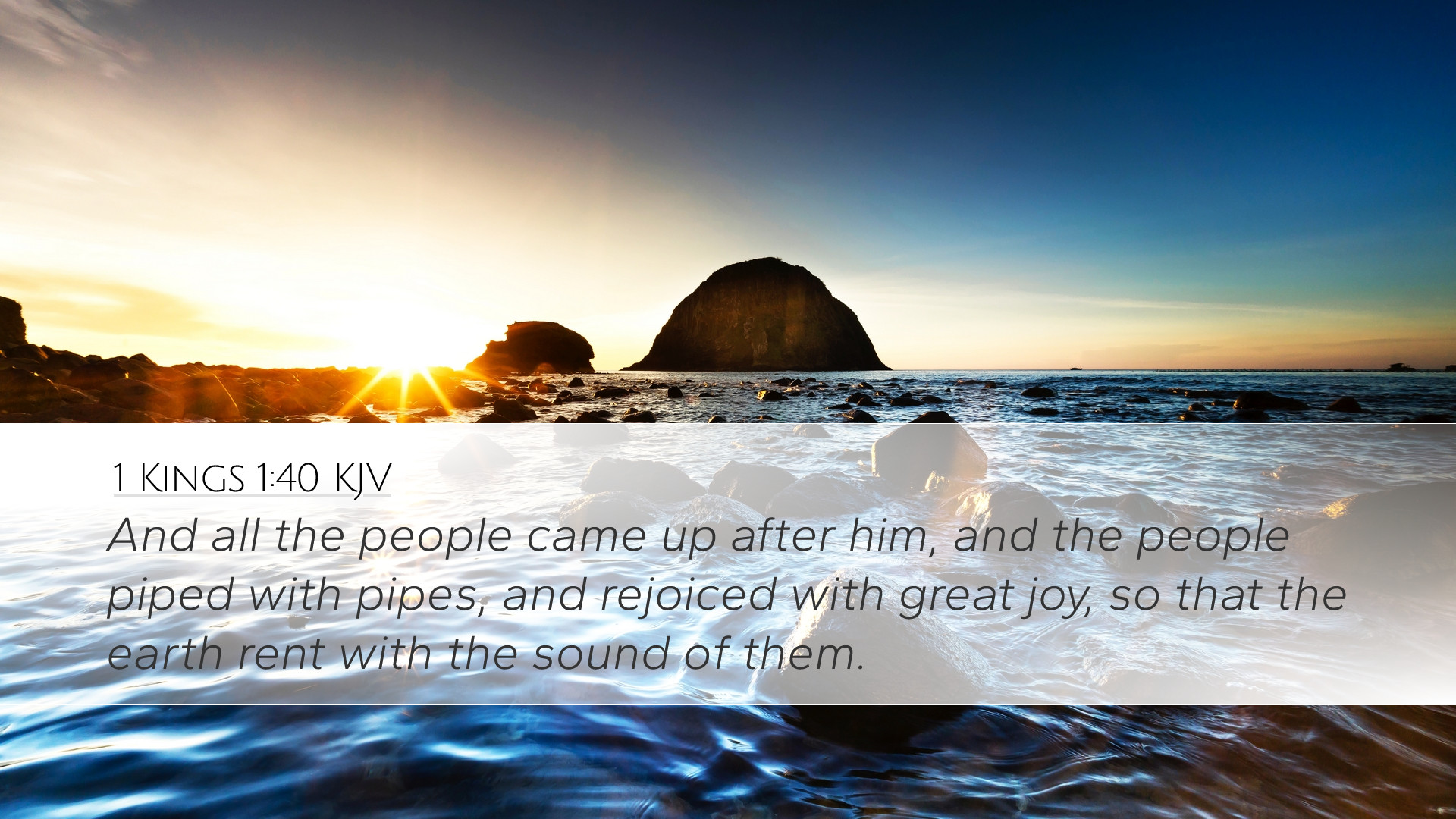Commentary on 1 Kings 1:40
1 Kings 1:40 reads: "And all the people came up after him, and the people piped with pipes, and rejoiced with great joy, so that the earth rent with the sound of them."
This verse captures a moment of significant transition in the monarchy of Israel, as it marks the anointing of Solomon as king. This commentary synthesizes insights from esteemed public domain commentaries, providing a multifaceted analysis aimed at pastors, students, theologians, and Bible scholars.
Contextual Background
The historical context of 1 Kings reveals a period of political strife and familial tension. David, the aging king, faces challenges to his throne from his son Adonijah. The anointing of Solomon is a climactic moment that establishes him as the rightful heir.
Matthew Henry notes that the events preceding this verse highlight the dangers of unmet ambition, as exhibited by Adonijah who attempted to seize the throne unlawfully. This provides a moral perspective on the foundations of leadership and legitimacy.
Interpretation of Key Terms
- People Came Up: Indicates a collective recognition and acceptance of Solomon’s kingship. This communal effort signifies unity, essential for the stability of the kingdom.
- Piped with Pipes: The act of music plays a significant role in ancient celebrations. Albert Barnes elaborates that music was integral in marking important events, demonstrating joy and the acknowledgment of God’s sovereignty.
- Rejoiced with Great Joy: The phrase encapsulates the overwhelming sentiment of the crowd, reflecting not only their loyalty but also divine favor upon Solomon’s reign. Adam Clarke emphasizes that such jubilation indicates a hope for peace and prosperity under Solomon’s leadership.
Theological Significance
The verse is rich in theological implications. The rejoicing of the people indicates a profound relationship between divine providence and human action. This event illustrates God’s active participation in the transition of leadership. Matthew Henry asserts that God’s choices are often contrary to human expectations, as Solomon was not the eldest; it is a reminder of God's sovereign election.
Emotional and Spiritual Dimensions
The emotional landscape of this moment is profound. As the crowd's joy fills the air, it reverberates beyond mere celebration, serving as a catalyst for national unity. Adam Clarke notes that the exuberance reflects the people's hope for a better future, a spiritual yearning that resonates deeply within the community of Israel.
This moment serves as a liturgical model, demonstrating how celebrations should magnify God’s active role in the events of human history. For modern believers, it encourages an understanding of worship as both communal and deeply personal.
Lessons for Leadership
In reflecting on this passage, several lessons for contemporary leaders emerge:
- Legitimacy and Divine Endorsement: Leaders are ultimately appointed by God and must seek His favor above all. Solomon's anointing demonstrates that God’s choice can transcend human hierarchies.
- Community Involvement: Leaders must cultivate a sense of community. Solomon’s acceptance by the people shows that leadership is not merely top-down but requires active participation from the people.
- Joy as a Strength: The great joy expressed underscores the importance of celebrating God’s blessings. Joy can unite people and nurture a positive environment essential for effective leadership.
Conclusion
1 Kings 1:40 serves as a powerful reminder of the transformative power of God's choice in leadership and the community's role in embracing that choice with joy and unity. It calls on us to reflect on the nature of our leadership, the kind of communities we build, and how we celebrate God’s providential hand in our lives.


